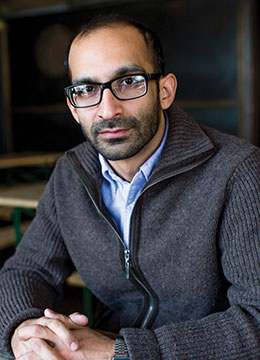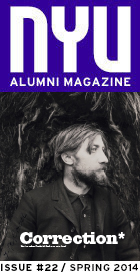nonfiction
Voice of America—and Pakistan
Journalist Shahan Mufti explains his two homes to each other
by Nancy Bilyeau
Behind every book is a personal story, but few authors have one as rich and far-reaching as Shahan Mufti, who since childhood has shuttled between Pakistan and the United States, and, since 2007, covered the former as a war correspondent. His debut book, The Faithful Scribe: A Story of Islam, Pakistan, Family, and War (Other Press), is part memoir, part social studies lesson.

It begins in Lahore in 1971, with his parents’ arranged marriage. On the eve of the wedding, India joined the war that would divide Bangladesh from Pakistan, and distant explosions sounded off during the festivities. From this joyous and violent occasion, Mufti (GSAS ’09) weaves together his family’s and nation’s stories, laying out the recent past—such as Pakistan’s 1956 founding as the first Islamic Republic—and the ancient dynasties that continue to impress upon the region. (One of Mufti’s more fascinating discoveries is a family tree written by an ancestor who traces his clan back 14 centuries to the inner circle of Muhammad.) The result is an insightful, suspenseful read that asks hard questions of both Pakistan and the United States, and has won him high praise: The New Yorker singled out his “talent for explaining the political through the personal.”
Mufti, who has written for Harper’s, Atlantic Monthly, The New York Times Magazine, as well as this magazine, and teaches journalism at the University of Richmond, recently spoke with us.
Did you ever consider writing this book without inserting yourself and your family?
Actually, the family did come later. I knew I had a certain perspective on this that not everybody shared, which was being between these two worlds, Pakistan and the U.S. As a narrative journalist, I did feel strongly that I needed characters to tell the story. But I didn’t think at first that the characters would be my family members.
What was their reaction to the book?
My parents read it. Everyone is pleased. I haven’t alienated anybody, which was difficult, because I was trying to be very truthful about what I thought. Not everyone in my family in Pakistan can read English—I hope it is translated one day. It would be interesting to see the reaction there to the book. The stuff I’ve laid out is not necessarily stuff that has been said in Pakistan.
Were you driven by a sense of urgency to tell the story now?
I was frustrated as a writer, because there are huge problems with the way war is covered. The humanness of war is very hard to capture. We have so much information as Americans about the war—just look at WikiLeaks—and we have no understanding of what war is, still. I think it was that desire to translate the reality and the understanding of war and this other place that is so large in our imagination—Pakistan—and it wasn’t just giving information about who’s the new leader of the new militant group. That is not going to lead us to peace or to anywhere useful even. What is going to lead us [someplace useful] is understanding.
Are you hopeful that reading your book will lead to greater understanding?
Of all these Muslim countries, Pakistan is the one that America should be able to understand pretty well. [It’s] a country that began in idealism and came out of a colonial period, [with] an Islamic Constitution written in English by Anglophiles. This shouldn’t be the hardest country to crack.





